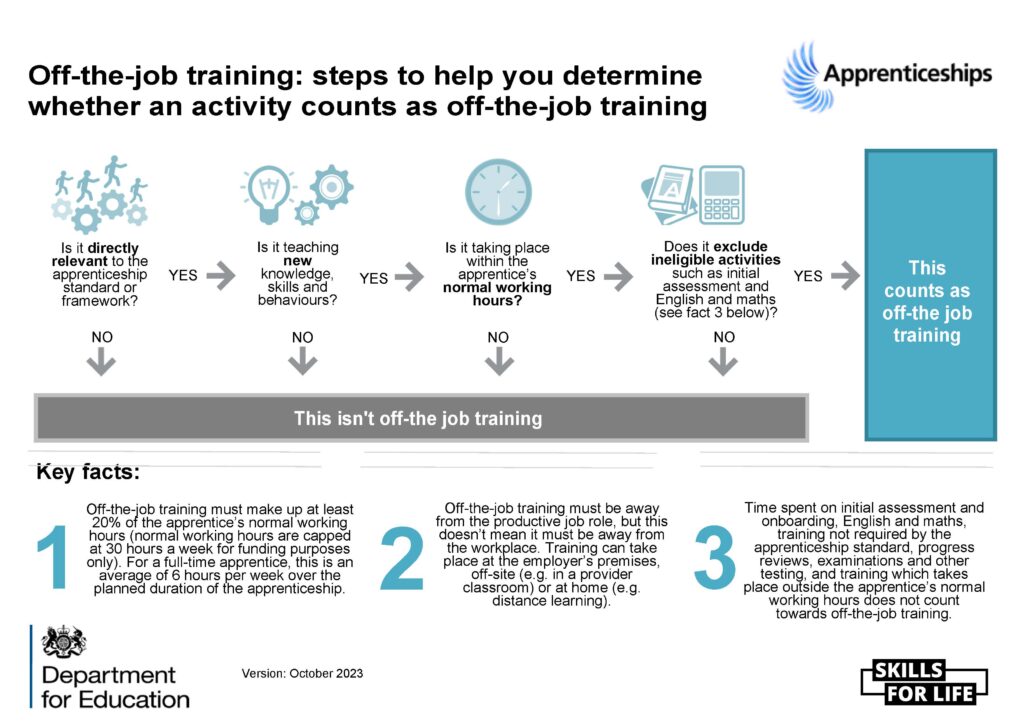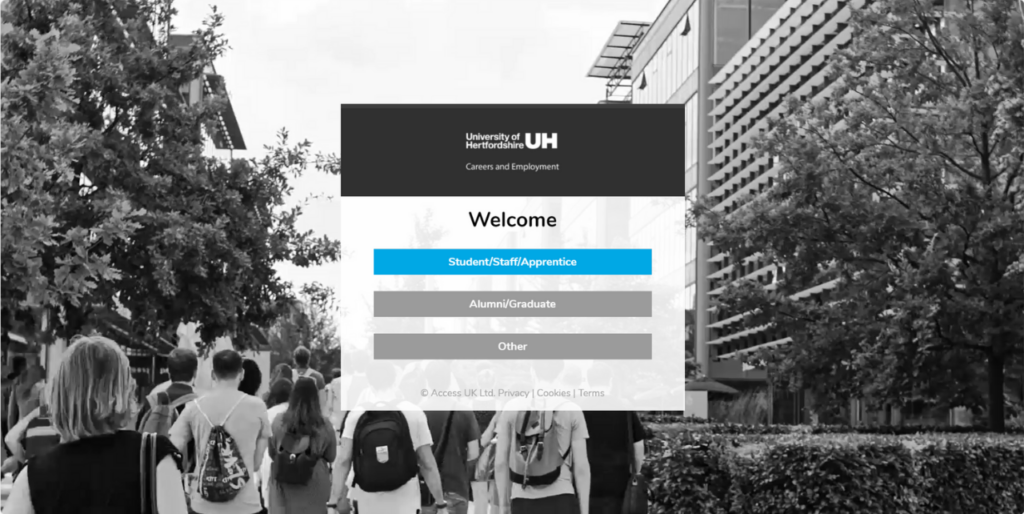1. What is Off The Job Training (OTJ)?
Off the Job training is a statutory requirement of the apprenticeship.
“..training which is received by the apprentice within their practical period, during the apprentice’s normal working hours, for the purpose of achieving the knowledge, skills and behaviours of the apprenticeship they are undertaking. By normal working hours we mean the hours for which the apprentice would normally be paid, excluding overtime.
It is not on-the-job training, which is training received by the apprentice for the sole purpose of enabling the apprentice to perform the work for which they have been employed. By this we mean training that does not specifically link to the knowledge, skills and behaviours set out in the apprenticeship“.
– ESFA Apprenticeship Funding Rules 2023-24
As a mentor, you can think of OTJ as time taken towards reaching the apprenticeship standards. OTJ is a statutory requirement for all apprentices in England. It is a minimum 6hrs (20%) per week for learners that are contracted for 30 or more hours per week. OTJ must:
- be conducted during the apprentice’s normal working hours and
- lead to new knowledge, skills, and behaviours.
- Be logged each week and uploaded to APTEM, the degree apprenticeship management system.
The mentor’s role is crucial in making sure that the apprentice is accessing the necessary OTJ within their normal working hours and to take steps to protect that time. This can include lectures, online learning, simulation activities, work shadowing, mentoring, industry/field visits, learning support, and writing assignments.

2. Your role in Progress Review Meetings (PRMs)
My role at the PRM is to ensure it happens at the right time (they turn up) and all the necessary paperwork is completed. Also to champion the apprentice effectively giving the AC assurance that they are on the right track. I highlight specific examples of successes, development, growth in the organisation etc.
– SLA Employer Mentor
As a mentor, the key milestones for tracking the apprentice’s progress will take place through the tripartite Progress Review Meetings. These will be scheduled to take place every three months and recorded through APTEM.
In advance of the meeting, you will complete the Employer Mentor page on APTEM ready for discussion. Similarly, your apprentice has a page regarding their progress to complete prior to the meeting, and you may wish to have a discussion together.
The Employer Work-based Mentor in the review meeting has a role to:
- Inform the University on the how the apprentice is progressing.
- Share any concerns about the apprentice’s progress.
- Be appraised of the apprentice’s portfolio and areas for future development.
- Advise of any future off-the-job or on-the-job training opportunities that the apprentice may avail of.
The role of the Apprenticeship Coach at the review meeting is to:
- Co-ordinate the meeting
- Review the apprentice’s progress and portfolio giving feedback and guidance.
- Share the apprentice’s academic achievement with the Employer/Mentor and any other relevant issues.
- Identify future goals and timeline.
- Complete the progress review template and attribute actions as required.
- Agree date, time and venue for the next meeting.
The role of the Apprentice for review meetings is to:
- Update the portfolio and ensure OTJ training hours are up-to-date
- Review learning goals and objectives
- Reflect on your progress
- Prepare questions and topics for discussion and engage in goal setting
- Act on feedback
These review meetings may be face to face, conducted via Teams (or similar) or via telephone. A record of each meeting must be made (Progress Review Template) and uploaded to the Apprentice’s Individual Learning Record, hosted on APTEM as part of their Portfolio.
3. How to access Aptem for PRM
There is a selection of videos to help you with accessing and using Aptem over on the Aptem Assistance page.
4. Coaching and Mentoring
A mentor should guide and support their apprentice in filling their potential, through both on-the-job and off-the-job learning. Evidence suggests that the quality of mentoring significantly affects both apprentice learning and the contribution they make to organisational success.
The apprentice may be a new employee or a colleague who has worked at your organisation for some time. The needs of individuals will vary accordingly.
As a mentor, you also need to be supported in thinking through some of the complexities of the mentoring role, for example, in considering where the boundaries lie between your mentoring role and your other roles within the organisation. You also need to consider how your mentoring role and your other roles within the organisation. You also need to consider how your mentoring work will fit with other time and task commitments. You may find it useful to explore with your line manager what organisational support you need to become a confident and successful mentor.
Mentors work to support their mentees’ learning in an organisational context. In this case, your mentee will be an apprentice who is undertaking a degree apprenticeship at the University of Hertfordshire whilst also working for your organisation. A balance has to be struck between the needs of the apprentice and those of the organisation although apprentice support remains your primary aim in your mentor role. A potential conflict of interest may arise here, particularly if you are also the apprentice’s line manager. It is important to be clear within the organisation where the boundaries of each of your roles lie.
5. British Values (FBVs)
British values
You may hear apprentices talking about British values and this will be a topic for discussion at the tripartite meetings. As part of the apprenticeship, the University has a responsibility to promote the British Values. These are:
- Mutual respect
- Rule of law
- Tolerance – of those with different faiths and beliefs
- Individual liberty
- Democracy
The British values align with the University’s values, objectives, and policies and are embedded in all our practices.
Our apprentices will have many opportunities to consider and explore these values in the context of their learning, work practice, and daily lives. We expect that all our apprentices will espouse these values by being part of the culture of the University.
6. Safeguarding and Prevent
Safeguarding
The University is committed to ensuring that a safe and supportive environment exists for all students, staff , and visitors to the University. Our approach to safeguarding and our responsibility to report and support is outlined in this policy.
All apprentices are made aware of this policy.
For our apprentices, we have a designated Safeguarding manager: Karen Turner. Karen may be contacted at k.v.turner@herts.ac.uk. Each School will have a Safeguarding lead who is also available to support your apprentices and ensure their safety and wellbeing.
Prevent
Like all public bodies, the university has a duty to prevent students from being drawn into terrorism or violent extremism. Prevent information will form a part of the apprentice’s induction to the University.
Our Dean of Students Office is the point of contact for any concerns about an apprentice 01707 284450 (ext 4450)
7. Professional and Personal Development
The University of Hertfordshire Careers Service
The University of Hertfordshire Careers and Employment Service is available to your apprentice throughout their studies and for four years after they complete their apprenticeship program.
Each month, all apprentice learners receive a Personal and Professional Development newsletter. We encourage you to have your apprentice read and engage with the content, as it supports their growth beyond their main job responsibilities. This, in turn, will help them become even more effective employees.
Learners also have access to a dedicated set of resources, designed specifically for them on Herts.careercentre. They log in using their University login.
Additionally, once learners have accessed Herts. career centre, they will receive a weekly newsletter from the Careers team. This newsletter provides updates on events and other opportunities available to all University of Hertfordshire students.

Learners can also access the Herts Handshake platform using their university login credentials. Through this platform, they can book appointments with the Careers Service to discuss their development, view career events, and explore job vacancies (if relevant). Additionally, a Handshake App is available for both iOS and Android devices.
Encouraging your Apprentices to engage with their Personal and Professional Development both inside and out of work
Please encourage your Apprentice to consider their own self-development alongside their everyday job role. There is lots of information on Herts.careercentre to support them with development.
Below are some areas to discuss with your Apprentice if you feel it is appropriate.
Be the first to volunteer
Being the first person to come forward when your manager asks for a volunteer is a good way to get noticed as a responsible and motivated person. This may encourage managers to delegate tasks to you because you’ve shown a willingness to take on responsibilities. This attitude reflects well on you and shows that you’re a team player.
Start with smaller tasks
You can build up to large and complex responsibilities by first taking on smaller duties. Once you learn how to manage the smaller tasks and integrate them into your current list of responsibilities, you can start taking on bigger ones. This also ensures you’re not overwhelmed by taking on too many responsibilities too quickly. It also gives you the chance to learn how much you can handle within a given workday.
Offer to lead a project
If you feel you can lead a project, bring this to your manager’s attention. Let them know you believe you have the right experience and skills to do a good job. When you finally get the chance to lead a project, make sure you give it your best effort. This is your chance to prove what you are capable of if your manager decides to give you more responsibility in the future.
Join work-related initiatives
Many places of employment organise various events and initiatives for staff to involve themselves in. This may be a sports team, an environmental initiative, or a mental health awareness group. By actively engaging with these groups and events, you can display your leadership qualities. Once you’ve established yourself as an important member of such a group, try to work your way up to leading the group, as this can make you stand out to managers when it comes to allocating additional responsibilities.
8. Quality Assurance and Compliance
The Office for Standards in Education, Children’s Services and Skills (Ofsted) is responsible for ensuring the quality of apprenticeship provision at levels 5, 6 and 7. This means that all higher and degree apprenticeship programmes delivered by the University of Hertfordshire will be inspected.
The inspection process involves meeting with apprentices and employers as part of their evidence gathering. The inspectors will ask about your experience of working with the University to train your apprentices. This evidence is used to make a judgement on the quality of the provision.
We will provide you with information and an Employer Briefing paper when we become aware of an inspection. We thank you in advance for your time and support in this important activity.
ESFA
The Education and Skills Funding Agency (ESFA) is responsible for establishing the rules and compliance around degree Apprenticeships. These rules are very detailed and updated annually. As an employer mentor your role is to ensure compliance with these rules supported by your ETL. For example, ESFA requires your attendance at all PRM meetings.
Complaints and Appeals
The University of Hertfordshire has a fair and transparent procedure for handling complaints and academic appeals. Further information is accessible to apprentices via the Dean of Students’s office.
If the apprentice wishes to complain about their non-integrated EPA or the End Point Organisation they may complain directly to their employer or to the University.
We aim to resolve all differences informally and suggest that you contact the Programme Leader in the first instance.
Details on how to make a formal complaint can be found here.
Any party may at any time contact the Apprenticeship Helpline regarding apprenticeship concerns, complaints, and enquiries:
Telephone: 08000 150 400
9. The benefits of being a mentor
Our mentors give us terrific feedback on their experience of mentoring – including:
- Developing their coaching and mentoring skills – and highlighting this within their own appraisals to their line managers to ensure that recognition
Those reflection sessions with the apprentice – asking How did that make you feel? What do you think you learned out of that? Is there anything that we haven’t covered? Is there anything else you would like to do?
– SLA Employer Mentor
- Maximising their own network, and reaping the rewards of championing a keen learner, as well as deepening their organisational insight
I think it’s using the rest of the resources around organisation as well as just yourself.
– SLA Employer Mentor
- A rewarding experience to play a key role in the success of the apprenticeship – giving back
Being a mentor for me is helping someone navigate a journey I’ve been on and can relate to. I get to point out the twists, turns and the scenery they’d otherwise miss as they are so focused on the destination they forget to enjoy or take in the journey.
– SLA Employer Mentor
- Tackling key projects or exploring new opportunities by tapping into their apprentice’s learning
It’s enjoyable. I think I’ve learned a lot from the conversations we’ve had – not least we’re doing some of the things in our department differently – that’s driven by her learning on the course.
– SLA Employer Mentor









